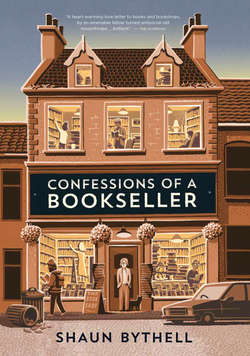Читать книгу Confessions of a Bookseller - Shaun Bythell - Страница 46
На сайте Литреса книга снята с продажи.
Saturday, 14 February
ОглавлениеOnline orders: 2
Orders found: 2
A clear, still day. Nicky opened the shop.
After work I lit the fire and began re-reading Orwell’s Down and Out in Paris and London, the Penguin Modern Classics edition. I tend not to re-read books, thinking that my time would be better spent reading something new, but a customer was talking about it just before I closed the shop and I remembered how much I’d enjoyed it, so I picked a copy off the shelf.
There are some titles, and some authors, that as a bookseller you feel you really ought to have on your shelves to differentiate you from the Danielle Steel and Catherine Cookson stock that dominates so many charity shops. And it’s not just the obvious classics—Jane Austen, the Brontës, Thomas Hardy, Charles Dickens, Mark Twain and their like. There are books that, as a bookseller, you feel embarrassed to be asked for and not have in stock: Machiavelli’s The Prince, anything by Hemingway or F. Scott Fitzgerald, Joseph Conrad, J. D. Salinger, Isaak Walton’s The Compleat Angler, To Kill a Mockingbird, Catch-22, Milan Kundera’s The Unbearable Lightness of Being, Moby Dick, Brave New World, 1984, The Go-Between, anything by Murakami, George Orwell, Virginia Woolf, Daphne du Maurier . . . The list is endless, but more often than not, when we’re asked, we won’t have the book the customer is looking for. It’s different for shops selling new books: they can pick and choose their stock, provided it’s in print. In the second-hand book trade, we’re at the mercy of what comes in: we can’t ‘order’ a replacement for Catcher in the Rye when the only copy on our shelves has sold. It often feels as though customers consider us to have failed them when we don’t have a well-known title in stock, but these are the titles that sell most readily, and replacing them is a matter of sheer luck, depending on when we next chance upon a copy.
It is entirely possible that the reason we never seem to be short of The Da Vinci Code and Fifty Shades of Grey is that the tendrils of these books don’t reach deeply enough into the souls of readers for them to wish to hang on to the books, so they’re less reluctant to dispose of them. The Catcher in the Rye must surely—over the years since it was first published in 1951—have been published in greater numbers than Dan Brown, but still we don’t see them in the same numbers being offered for sale in the second-hand book trade.
Till Total £78
6 Customers
